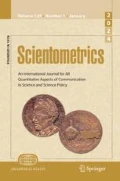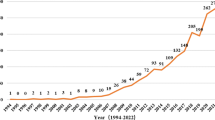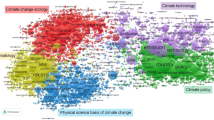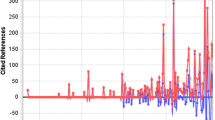Abstract
This study addresses whether interdisciplinarity is a prominent feature of climate research by means of a co-citation analysis of the IPCC Third Assessment Report. The debate on interdisciplinarity and bibliometric measures is reviewed to operationalize the contested notion of interdisciplinarity. The results, based on 6417 references of the 96 most frequently used journals, demonstrate that the IPCC assessment of climate change is best characterized by its multidisciplinarity where the physical, biological, bodily and societal dimensions are clearly separated. Although a few fields and journals integrate a wide variety of disciplines, integration occurs mainly between related disciplines (narrow interdisciplinarity) which indicate an overall disciplinary basis of climate research. It is concluded that interdisciplinarity is not a prominent feature of climate research. The significance of this finding is explored, given that the problem scope of climate change necessitates interdisciplinarity. Ways to promote interdisciplinarity are suggested by way of conclusion.




Similar content being viewed by others
References
Abbott, A. (2001). Chaos of disciplines. Chicago: University Chicago Press.
Agrawala, S. (1998a). Context and early origins of the intergovernmental panel on climate change. Climatic Change, 39(4), 605–620.
Agrawala, S. (1998b). Structural and process history of the intergovernmental panel on climate change. Climatic Change, 39(4), 621–642.
Balaban, A., & Klein, D. (2006). Is chemistry ‘The central science’? How are different sciences related? Co-citations, reductionism, emergence, and posets. Scientometrics, 69(3), 615–637.
Becher, T., & Trowler, P. (2001). Academic tribes and territories: Intellectual enquiry and the cultures of disciplines (2nd ed.). Buckingham: Open University Press/SRHE.
Bjurström, A., Polk, M. (2011). Physical and economic bias in climate change research: A scientometric study of IPCC Third Assessment Report. Climatic Change.
Bolin, B. (2007). A History of the science and politics of climate change: The role of the intergovernmental panel on climate change. Cambridge: Cambridge University Press.
Bordons, M., Morillo, F., & Gómez, I. (2004). Analysis of cross-disciplinary research through bibliometric tools. In H. F. Moed, W. Glänzel, & U. Schmoch (Eds.), Handbook of quantitative science and technology research (pp. 437–456). Dordrecht: Kluwer.
Bordons, M., & Zulueta, M. (1997). Comparison of research team activity in two biomedical fields. Scientometrics, 40(3), 423–436.
Borgatti, S., Everett, M., & Freeman, L. (2002). Ucinet for windows: Software for social network analysis. Harvard, MA: Analytic Technologies.
Börner, K., Chen, C., & Boyack, K. (2005). Visualizing knowledge domains. Annual Review of Information Science and Technology, 37(1), 179–255.
Boyack, K., Klavans, R., & Börner, K. (2005). Mapping the backbone of science. Scientometrics, 64(3), 351–374.
Braun, T., & Schubert, A. (2003). A quantitative view on the coming of age of interdisciplinarity in the sciences 1980–1999. Scientometrics, 58(1), 183–189.
Bruce, A., Lyall, C., Tait, C., & Williams, R. (2004). Interdisciplinary integration in Europe: The case of the fifth framework programme. Futures, 36(4), 457–470.
Bruun, H. (2000). Epistemic encounters: Intra- and interdisciplinary analyses of human action, planning practices and technological change. Dissertation, Göteborg University, Göteborg.
Buanes, A., & Jentoft, S. (2009). Building bridges: Institutional perspectives on interdisciplinarity. Futures, 41(7), 446–454.
Camic, C., Joas, H. (2003). The dialogical turn: New roles for sociology in the postdisciplinary age. New York: Rowman/Littlefield.
Carolan, M. (2008). The bright- and blind-spots of science: Why objective knowledge is not enough to resolve environmental controversies. Critical Sociology, 34(5), 725–740.
Case, S. (2001). Feminism and performance: A post-disciplinary couple. Theatre Research International, 26(2), 145–152.
Charlesworth, M., & Okereke, C. (2010). Policy responses to rapid climate change: An epistemological critique of dominant approaches. Global Environment Change, 20(1), 121–129.
Cohen, S., Demeritt, D., Robinson, J., & Rothman, D. (1998). Climate change and sustainable development: Towards dialogue. Global Environmental Change, 8(4), 341–371.
Crutzen, P. (2002). Geology of mankind: The Anthropocene. Nature, 415, p. 23.
Demeritt, D. (2001). The construction of global warming and the politics of science. Annals of the Association of American Geographers, 91(2), 307–337.
Engels, A., & Ruschenburg, T. (2008). The uneven spread of global science: Patterns of international collaboration in global environmental change research. Science and Public Policy, 35(5), 347–360.
Engels, A., Ruschenburg, T., & Weingart, P. (2005). Recent internationalization of global environmental change research in Germany and the US. Scientometrics, 62(1), 67–85.
Fleming, J. (1998). Historical perspectives on climate change. New York: Oxford University Press.
Fuller, S. (1993). Philosophy, rhetoric, and the end of knowledge: The coming of science and technology studies. Madison, WI: University of Wisconsin Press.
Funtowicz, S., & Ravetz, J. (1991). A new scientific methodology for global environmental issues. In C. Robert (Ed.), Ecological economics: The science, management of sustainability (pp. 137–152). New York: Columbia University Press.
Geertz, C. (1980). Blurred genres: The refiguration of social thought. American Scholar, 49(2), 165–179.
Gibbons, M., Limoges, C., Nowotny, H., Schwartzman, S., Scott, P., & Trow, M. (1994). The new production of knowledge. The dynamics of science and research in contemporary societies. Stockholm: Sage.
Giddens, A. (2009). The politics of climate change. Cambridge: Polity Press.
Glänzel, W., & Schubert, A. (2004). Analysing scientific networks through co-authorship. In H. Moed, W. Glänzel, & U. Schmoch (Eds.), Handbook of quantitative science and technology research. Dordrecht: Kluwer.
Godin, B. (1998). Writing performative history: The new Atlantis? Social Studies of Science, 28(3), 465–483.
Gomez, I., Bordons, M., Fernández, M., & Méndez, A. (1996). Coping with the problem of subject classification diversity. Scientometrics, 35(2), 223–235.
Good, G. (2000). The assembly of geophysics: Scientific disciplines as frameworks of consensus. Studies in the History and Philosophy of Modern Physics 31(3), 259–292.
Hessels, L., & Lente, H. (2008). Re-thinking new knowledge production: A literature review and a research agenda. Research Policy, 28(4), 740–760.
Horlick-Jones, T., & Sime, J. (2004). Living on the border: Knowledge, risk and transdisciplinarity. Futures, 36(4), 441–456.
Hulme, M. (2009). Why we disagree about climate change. Cambridge: Cambridge University Press.
IPCC. (2001a). Climate Change 2001: Impacts, Adaptation & Vulnerability. Contribution of Working Group II to the Third Assessment Report of the Intergovernmental Panel on Climate Change.
IPCC. (2001b). Climate Change 2001: Mitigation. Contribution of Working Group II to the Third Assessment Report of the Intergovernmental Panel on Climate Change (IPCC). In J. J. McCarthy, O. F. Canziani, N. A. Leary, D. J. Dokken, & K. S. White (Eds.). Cambridge: Cambridge University Press.
IPCC. (2001c). Climate Change 2001: The Scientific Basis. Contribution of Working Group I to the Third Assessment Report of the Intergovernmental Panel on Climate Change. In J. T. Houghton, Y. Ding, D. J. Griggs, M. Noguer, P. J. van der Linden, X. Dai, K. Maskell, & C. A. Johnson (Eds.). Cambridge and New York: Cambridge University Press.
IPCC. (2007a). Climate Change 2007: Impacts, Adaptation and Vulnerability. Contribution of Working Group II to the Fourth Assessment Report of the Intergovernmental Panel on Climate Change In M. L. Parry, O. F. Canziani, J. P. Palutikof, P. J. van der Linden, & C. E. Hanson (Eds.). Cambridge: Cambridge University Press.
IPCC. (2007b). Climate Change 2007: Mitigation. Contribution of Working Group III to the Fourth Assessment Report of the Intergovernmental Panel on Climate Change In B. Metz, O. R. Davidson, P. R. Bosch, R. Dave, & L. A. Meyer (Eds.). Cambridge and New York: Cambridge University Press.
IPCC. (2007c). Climate Change 2007: The Physical Science Basis. Contribution of Working Group I to the Fourth Assessment Report of the Intergovernmental Panel on Climate Change. In S. Solomon, D. Qin, M. Manning, Z. Chen, M. Marquis, K. B. Averyt, M. Tignor, & H. L. Miller (Eds.). Cambridge and New York: Cambridge University Press.
Jacobs, J., & Frickel, S. (2009). Interdisciplinarity: A critical assessment. Annual Review of Sociology, 35, 43–65.
Janssen, M., Schoon, M., & Börner, K. (2006). Scholarly networks on resilience, vulnerability and adaptation within the human dimension of global environmental change. Global Environmental Change, 16(3), 240–252.
Jappe, A. (2007). Explaining international collaboration in global environmental change research. Scientometrics, 71(3), 367–390.
Jasanoff, S., & Wynne, B. (1998). Science and decisionmaking. In S. Rayner & E. Malone (Eds.), The societal framework. Human choice and climate change (Vol. 1). Columbus, OH: Battelle Press.
Klein, J. (1990). Interdisciplinarity. History, theory and practice. Detroit, MI: Wayne State University Press.
Klein, J. (1996). Crossing boundaries: Knowledge, disciplinarities, and interdisciplinarities. Charlottesville, VA: University Press of Virginia.
Kwa, C. (2001). The rise and fall of weather modification: Changes in American attitudes towards technology, nature, and society. In C. Miller & P. Edwards (Eds.), Changing the atmosphere: Expert knowledge and environmental governance. Cambridge: MIT Press.
Kwa, C. (2005). Local ecologies, global science: Discourses and strategies of the international geosphere-biosphere programme. Social Studies of Science, 35, 923–950.
Lamb, H. (1982). Climate, history and the modern world. London: Methuen.
Leichenko, R., & O’Brien, K. (2008). Environmental change and globalization: Double exposures. Oxford: Oxford University Press.
Lenhard, J., Lucking, H., & Schechheimer, H. (2006). Expert knowledge, mode-2 and scientific disciplines: Two contrasting views. Science and Public Policy, 33(5), 341–350.
Leydesdorff, L., & Wagner, C. (2008). International collaboration in science and the formation of a core group. Journal of Informetrics, 2, 317–325.
Leyedesdorff, L. (2007a). Betweenness centrality as an indicator of the interdisciplinarity of scientific journals. Journal of the American Society for Information Science and Technology, 58(9), 1303–1319.
Leyedesdorff, L. (2007b). Mapping interdisciplinarity at the interfaces between the science citation index and the social science citation index. Scientometrics, 71(3), 391–405.
Liu, Z. (2005). Visualizing the intellectual structure in urban studies: A journal co-citation analysis (1992–2002). Scientometrics, 62(3), 385–402.
Malone, E., & Rayner, S. (2001). Role of the research standpoint in integrating global-scale and local-scale research. Climate Research, 19, 173–178.
Max-Neef, M. (2005). Foundations of transdisciplinarity. Ecological Economics, 53(1), 5–16.
Miller, C. (2001). Hybrid management: boundary organizations, science policy, and environmental governance in the climate regime. Science Technology Human Values, 26(4), 478–500.
Mobjörk, M. (2009). Crossing boundaries. The framing of transdisciplinarity. Centre for housing and urban research series, report number 64. Västerås: Mälardalen University.
Moed, H., Glänzel, W., & Schmoch, U. (Eds.). (2004). Handbook of quantitative science and technology research. Dordrecht: Kluwer.
Morillo, F., Bordons, M., & Gómez, I. (2003). Interdisciplinarity in science: A tentative typology of disciplines and research areas. Journal of the American Society for Information Science and Technology, 54(13), 1237–1249.
Moya-Anegón, F., Vargas-Quesada, B., Herrero-Solana, V., Chinchilla-Rodríguez, Z., Corera-Álvarez, E., & Munoz-Fernández, F. (2004). A new technique for building maps of large scientific domains based on the co citation of classes and categories. Scientometrics, 61(1), 129–145.
Munasinghe, M. (2001). Exploring the linkages between climate change and sustainable development: A challenge for transdisciplinary research. Ecology and Society, 5(1), 14.
Newell, P. (2006). Climate for change: Non-state actors and the global politics of the greenhouse. Cambridge: Cambridge University Press.
Newell, B., Crumley, C., Hassan, N., Lambin, E., Pahl-Wostl, C., Underdal, A., et al. (2005). A conceptual template for integrative human—environment research. Global Environmental Change, 15, 299–307.
Nowotny, H., Scott, P., & Gibbons, M. (2001). Re-thinking science: Knowledge and the public in an age of uncertainty, polity press. Cambridge: Malden.
O’Neill, S., Hulme, M., Turnpenny, J., & Screen, J. (2010). Disciplines, geography and gender in the framing of climate change. Bulletin of the American Meteorological Society.
Pielke, R., & Sarewitz, D. (2005). Bringing society back into the climate debate. Population and Environment, 26(3), 255–268.
Pohl, C. (2005). Transdisciplinary collaboration in environmental research. Futures, 37, 1159–1178.
Porter, A., Cohen, A., Roessner, J., & Perreault, M. (2007). Measuring researcher interdisciplinarity. Scientometrics, 72(1), 117–147.
Porter, A., & Rafols, I. (2009). Is science becoming more interdisciplinary? Measuring and mapping six research fields over time. Scientometrics, 81(3), 719–745.
Porter, A., & Youtie, J. (2009). How interdisciplinary is nanotechnology? Journal of Nanoparticle Research, 11(5), 1023–1041.
Price, D. (1963). Little science, big science. New York: Columbia University Press.
Price, D. (1965). Networks of scientific papers. Science, 149, 510–515.
Qin, J. (1994). An investigation of research collaboration in the sciences through the philosophical transactions 1901–1991. Scientometrics, 29(2), 219–238.
Rafols, I., & Meyer, M. (2010). Diversity and network coherence as indicators of interdisciplinarity: Case studies in bionanoscience. Scientometrics, 82(2), 263–287.
Rayner, S., & Malone, E. (Eds.). (1998). The societal framework. Human choice and climate change. Columbus, OH: Battelle Press.
Roberts, J., & Parks, B. (2006). A climate of injustice: Global inequality, north-south politics, and climate policy. Cambridge: MIT Press.
Saloranta, T. (2001). Post-normal science and the global climate change issue. Climatic Change, 50, 395–404.
Sarewitz, D. (2004). How science makes environmental controversies worse. Environmental Science and Policy, 7(5), 385–403.
Schummer, J. (2004). Multidisciplinarity, interdisciplinarity, and patterns of research collaboration in nanoscience and nanotechnology. Scientometrics, 59(3), 425–465.
Shinn, T. (2002). The triple helix and new production of knowledge: Prepackaged thinking on science and technology. Social Studies of Science, 32(4), 599–614.
Siebenhüner, B. (2002). How do scientific assessments learn? Part 1 Conceptual framework and case study of the IPCC. Environmental Science & Policy, 5, 411–420.
Small, H. (1973). Co-citation in the scientific literature: A new measure of the relationship between two documents. Journal of the American Society for Information Science, 24(4), 265–269.
Song, C. (2003). Interdisciplinarity and knowledge inflow/outflow structure among science and engineering research in Korea. Scientometrics, 58(1), 129–141.
Stanhill, G. (2001). The growth of climate change science: A scientometric study. Climatic Change, 48(2–3), 515–524.
Storch, H., & Stehr, N. (2000). Climate change in perspective. Nature, 405, 615.
Turner, S. (2000). What are disciplines? And how is interdisciplinarity different? In P. Weingart & N. Stehr (Eds.), Practising interdisciplinarity. Toronto: University of Toronto Press.
Van Raan, A. (2000). The interdisciplinary nature of science: Theoretical framework and bibliometric-empirical approach. In P. Weingart & N. Stehr (Eds.), Practising interdisciplinarity. Toronto: University of Toronto Press.
Weingart, P. (1997). From “Finalization” to “Mode 2”: Old wine in new bottles? Social Science Information, 36(4), 591–613.
Weingart, P. (2000). Interdisciplinarity: The paradoxical discourse. In P. Weingart & N. Stehr (Eds.), Practising interdisciplinarity. Toronto: University of Toronto Press.
Weingart, P., & Stehr, N. (Eds.). (2000). Practising interdisciplinarity. Toronto: University of Toronto Press.
Acknowledgments
Gunilla A. Olsson, Karl Bruckmeier, Tom R. Burns, Jan Teorell, Marie Demker, Per Knutsson and Stina Edqvist are acknowledged for comments and support. The Centre for Environment and Sustainability at Göteborg University is acknowledged for financial support.
Author information
Authors and Affiliations
Corresponding author
Rights and permissions
About this article
Cite this article
Bjurström, A., Polk, M. Climate change and interdisciplinarity: a co-citation analysis of IPCC Third Assessment Report. Scientometrics 87, 525–550 (2011). https://doi.org/10.1007/s11192-011-0356-3
Received:
Published:
Issue Date:
DOI: https://doi.org/10.1007/s11192-011-0356-3




